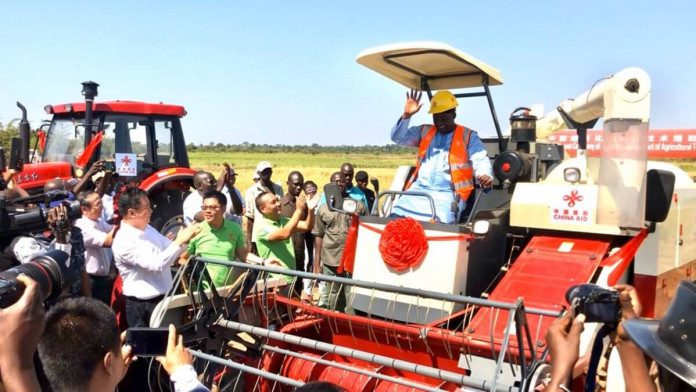News in Brief:
– A China-Gambia agricultural project is demonstrating success in boosting Gambian rice production through high-yielding hybrid rice varieties and mechanised farming techniques.
– The project has trained over 1,800 locals and expects to further contribute to food security and economic development through increased efficiency and improved post-harvest practices.
A first batch of improved rice varieties has been harvested from the fields of a collaborative agricultural project between China and Gambia.
The China-Gambia Agricultural Technology Cooperation Project, launched in April 2019, focuses on promoting hybrid rice varieties, mechanised rice production processes, and agricultural technology training.
Implemented by Yuan Longping High-Tech Agriculture Co., Ltd (LPHT) and the Central Project Coordination Unit (CPCU), the project operates in the Sapu core rice demonstration area.
The project prioritises exploring high-yielding rice cultivation models suited to the Gambian climate and irrigation methods. Through experimentation with planting times, transplanting methods, and water and fertiliser management, the project has established standardised production processes for rice grains during both rainy and dry seasons.

Specifically, the project showcases a total of 20 high-yield rice varieties, including both local conventional and Chinese hybrid options. The project’s hybrid rice varieties boast a maximum yield of 9.35 tons per hectare, with an average yield of 8 tons, which is significantly higher than the local conventional rice yield. Additionally, it has successfully registered two new rice varieties in Gambia, GMB LS 123 and GMB LS 2021.
Meantime, as a way of boosting overall productivity, over 1,800 local personnel have participated in technical training programs offered by the project, directly benefiting farmers and private enterprises.
For instance, Maruo Farms in the country’s Central River Region has leveraged the project’s guidance to significantly increase rice production and achieve full mechanisation.
Going forward, the project’s future endeavors include constructing a vegetable production demonstration center, while expanding the Sapu Core demonstration area’s infrastructure for rice processing and storage.



